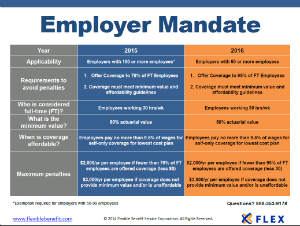healthcare reform
Last week, the Obama administration released several new Affordable Care Act (ACA) guidelines. Of particular note, any individual or small group with a non-ACA compliant plan will be able to keep that plan in place for additional time.
Can people apply for individual health coverage after Mar. 31, 2014?
Only those individuals that experience a qualifying event can sign up for a qualified health plan mid-year after March 31st. Most qualifying events will create a special enrollment period that lasts for 60 days.
Today is the last day of February which means we are only one month away from the end of the first open enrollment period for individual health plans. March 31st is the last day that individuals can sign up for coverage without a qualifying event, but there is one big question that is still looming – Will the open enrollment period get extended to a later date?
Yesterday, IRS officials made a significant announcement that impacts the Employer Shared Responsibility requirements, also known as the Employer Mandate. New guidance issued by the IRS confirms that a new phased approach will be utilized to implement it.
The new approach has 3 significant changes to the previously written rules:
- The Department of Health and Human Services (HHS) has reported Exchange application submissions have exceeded 3 million.
- The Congressional Budget Office (CBO) has updated 2014 Exchange enrollment estimates to 6 million.
- Some reports are showing that 22,000 Exchange applicants were enrolled in the wrong plan or received a lower subsidy than expected, 15,000 Exchange applications were lost and only 11% of Exchange applicants were previously uninsured.
As one of the essential health benefits covered in the Health Insurance Marketplace, pediatric dental care has been top of mind. This February will be the first time that National Children’s Dental Health Month will take place while the Affordable Care Act (ACA) is in full swing.
The U.S. Department of Health and Human Services (HHS) published the 2014 Federal Poverty Levels (FPL) last week. The 2014 FPL guidelines have been raised 1.5% in comparison to the 2013 FPL. The FPL is a measure of income used to determine eligibility for various government programs including healthcare, housing and food stamps. The FPL is also used as part of the Affordable Care Act (ACA) to determine eligibility for subsidies available through the Health Insurance Marketplace, also known as the Exchange.
Winter in Chicago. As the joke goes the only other season should be construction. Now that the worst of the polar vortex has passed (or we’ve grown accustomed to it) people are more expressive and passionate about two things this week: food and health care reform.
An employer can be fined up to $100 per day for every employee that had a waiting period in excess of 90 calendar days.
The Affordable Care Act (ACA) imposes a new rule that group health plans cannot have a waiting period of more than 90 calendar days.
Benefits Buzz
Enter Your Email









